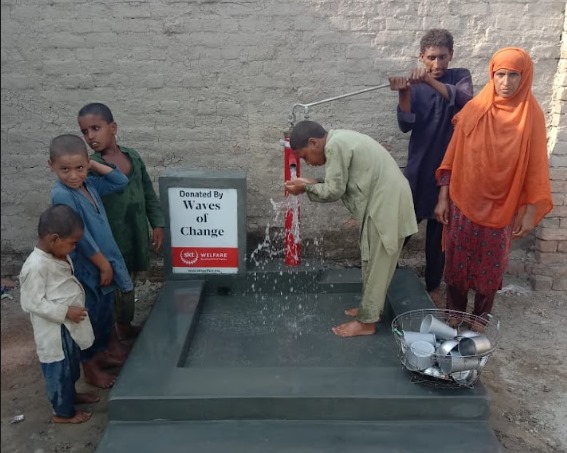
Cha Tibay Wala Water Drive
Completed on 27th August 2024 • Tehsil Kot Addu, District Muzaffargarh

Cha Tibay Wala Village Overview
Location: Cha Tibay Wala is a village located in the Kot Addu tehsil of Muzaffargarh District in the Punjab province of Pakistan. It is situated near the Indus River, contributing to the agricultural landscape of the region.
Population: The village has a small, close-knit community, with a mix of various ethnic groups. The residents primarily depend on agriculture and local trades for their livelihood.
Economy: The economy of Cha Tibay Wala is predominantly agricultural. The fertile land supports the cultivation of crops such as wheat, cotton, and sugarcane. Many villagers also engage in livestock farming.
Culture: The village culture is rich in traditional Punjabi customs, with celebrations often revolving around agricultural cycles and local festivals. Community gatherings, weddings, and cultural events play an important role in village life.
Infrastructure: Cha Tibay Wala has basic infrastructure, including roads, schools, and health facilities, though improvements are needed in some areas to enhance living standards.
Education: The village has primary and secondary educational institutions, with efforts ongoing to improve literacy rates and access to quality education.
Challenges: Like many rural areas in Pakistan, Cha Tibay Wala faces challenges such as limited access to healthcare, education, and infrastructure development. However, community initiatives aim to address these issues.
Project Summary
The Cha Tibay Wala Village Water Drive was the second successful initiative under the Waves of Change campaign. Located in the Kot Addu Tehsil of Muzaffargarh District, Cha Tibay Wala is an agricultural village nestled near the Indus River. Despite being surrounded by water sources, the local community lacked direct access to clean drinking water for years.
The local population, especially women and children, faced daily challenges in collecting water from distant and often contaminated sources. This not only impacted their physical health but also consumed time that could have been used for education, income generation, or care work.
After surveying the village and engaging with local leaders, the team installed a durable, manually operated hand pump in the home of Shahida Bibi. This site was chosen for its accessibility to surrounding families and proximity to the village center. The pump serves over 8 family members directly and benefits many more indirectly within the community.
Local labor was employed during the installation, ensuring community participation and economic support. The hand pump was constructed with reinforced concrete and a proper drainage solution to maintain hygiene and long-term usability.
Since the pump was installed, the positive changes have been immediate and measurable. Residents now have safe water on demand, reducing the risk of waterborne diseases and improving daily routines. The children in the area, once burdened with fetching water, now have more time for school and play.
This project reaffirms our mission — to restore dignity and basic human rights through clean water access. The Cha Tibay Wala hand pump is more than a water source — it’s a symbol of progress, resilience, and shared humanity.